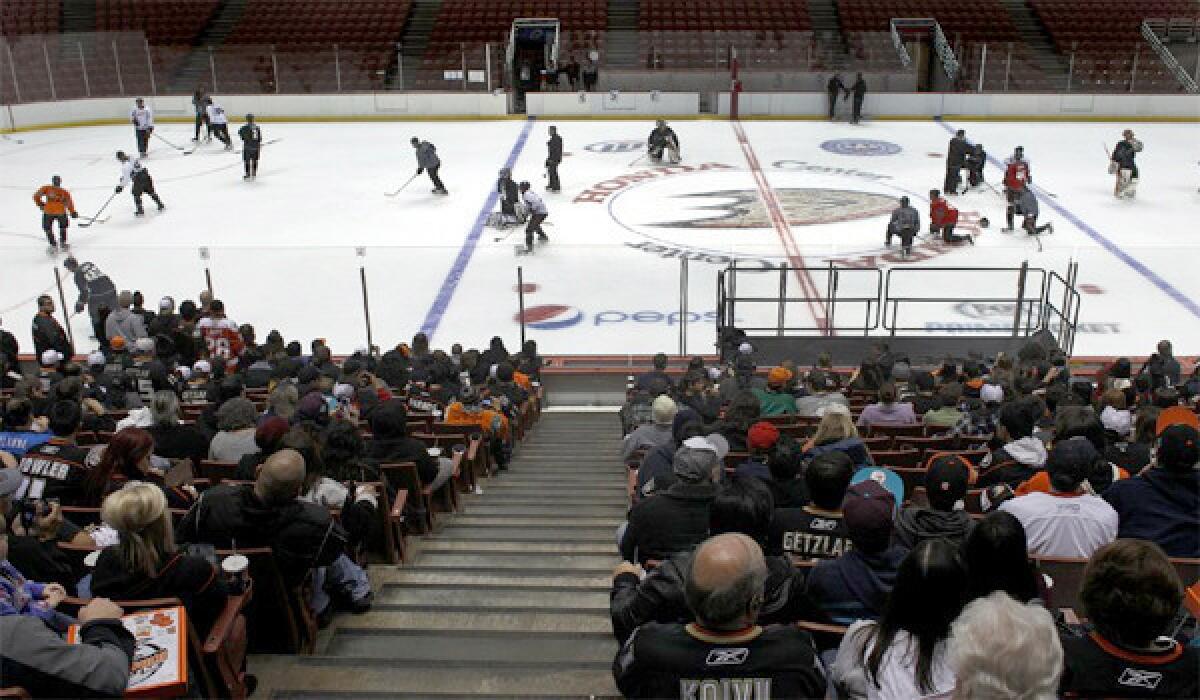Ducks owner Samueli committed to a state-of-the-art Honda Center

- Share via
Ducks owner Henry Samueli, whose management company operates the Honda Center, said Wednesday he doesn’t anticipate bringing an NBA team to the arena as a tenant any time soon but he remains committed to backing his money-losing NHL team and maintaining a state-of-the-art arena.
Samueli and his wife, Susan, bought the Ducks from the Walt Disney Co. in 2005 and have since spent $80 million on arena improvements. That includes upgrading locker rooms to NBA standards and undertaking the $20-million Grand Terrace entertainment project that will open Oct. 10, coinciding with the Ducks’ home opener. The Sacramento Kings were the most recent NBA team to flirt with moving to Anaheim but they were sold to a Sacramento group and will remain in that city.
“It’s pretty much put to rest from our perspective,” Samueli said of adding an NBA tenant. “If an opportunity presents itself we’ll look at it but we haven’t had any contact with the NBA for quite a while.
“You never give up, but clearly it’s not going to happen in the near term. But our goal is to make this building a world-class sports and entertainment venue and if the opportunity presents itself in the future, we’ll be ready for it.”
The Grand Terrace project includes indoor and outdoor entertainment space, food and drink options, and an expanded team store. “It’s just going to elevate the whole fan experience,” said Samueli, a co-founder of Broadcom and still board chairman and chief technical officer of the semiconductor company.
Despite the lack of an NBA team and the revenues it would generate, Samueli said he stands behind the Ducks long term. He and his wife paid $75 million for the franchise; it was valued at $192 million by Forbes last November.
“We look at it from a different perspective, Susan and I,” he said. “We’re not depending on this business to support our family. I have a very successful business in Broadcom, and to us, this is our way of giving back to the community.
“Susan and I are very active in philanthropy, so we already give to lots of nonprofits. So the Ducks are just yet another nonprofit that we give to, I guess.”
Samueli said it’s too early to determine the financial impact of the NHL’s new collective bargaining agreement because last season was shortened to 48 games by the league-imposed lockout. The Ducks became eligible for revenue sharing for the first time, but for only half of a full share.
“It’s still more than what we got before. So anything helps,” he said. “Clearly it’s always a struggle in the Sun Belt markets to make a go of the business, but the new CBA definitely will help.”
Samueli also said he likes the new schedule, which will match each team against every other team at least twice, and realignment. The Ducks, Kings, and five other teams will compete in the Pacific Division.
“The first two rounds of the playoffs will be within your division, which means, assuming the Ducks and Kings both make the playoffs, the likelihood of us playing each other is very high, which we’ve never done before in the playoffs,” he said. “That’s great for Southern California hockey, having a Ducks-Kings rivalry in the playoffs. There’s nothing better, and this realignment definitely will make that a likely possibility.”
Twitter: @helenenothelen
More to Read
Go beyond the scoreboard
Get the latest on L.A.'s teams in the daily Sports Report newsletter.
You may occasionally receive promotional content from the Los Angeles Times.











